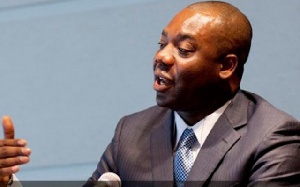 Dr Matthew Opoku-Prempeh, the Minister of Education
Dr Matthew Opoku-Prempeh, the Minister of Education
Government says apart from releasing funds for the implementation of the Free Senior High School (SHS) Policy, it will also pay all long-standing arrears owned educational institutions across the country.
He said outstanding arrears for the Capitation Grant, the School Feeding Programme, feeding grants of students in the three northern regions and handicapped schools would be paid up to date.
In addition, teacher trainee allowances would be restored as promised by the Government.
Dr Matthew Opoku-Prempeh, the Minister of Education, made the disclosure at the launch of the Free SHS Policy initiative at the West Africa Senior High School in the Adenta Municipality of the Greater Accra Region on Tuesday.
He said the free SHS initiative was a revolutionary policy that would propel the transformation and development of the nation because no child would be denied second cycle education due to financial constraints.
Dr Opoku-Prempeh noted that the policy was being implemented not because of political expediency, but it was the right thing to do for the people of Ghana.
“No matter how poor a child’s family is, he or she will never be shackled by the manacles of school fees as he or she lived out his or her dream.
‘‘The days of poor students being left on the streets because of poverty are over, the days of parents at their wit ends scrambling to find admission fees are over, the days of young students being driven from the classroom to go home for their school fees are over,” he said.
Dr Opoku-Prempeh said the Education Ministry was proud to be part of the implementation of the historic policy and expressed the hope that for many generations to come, the Free SHS Policy would be itched in the letters of gold as one of the greatest legacies of President Nana Addo Dankwa Akufo-Addo and his Government.
To ensure that the policy was fully funded, he said, the Government had already paid 20 per cent of the fees of the beneficiaries to their selected SHSs.
Professor Kwasi Opoku-Amankwa, the Director-General of the Ghana Education Service (GES), said such a major policy intervention to Ghanaians was arguably the most significant policy initiative given aside the National Health Insurance Scheme.
He said the general euphoria in welcoming the policy showed the appreciation of Ghanaians and called for effective leadership to ensure its success and sustainability.
Prof. Opoku-Amankwa expressed gratitude to the Free SHS Implementation Committee, the GES Council, teacher unions and all stakeholders for their tireless efforts to make it possible.
The Free SHS/TVET Policy is intended to relieve the huge financial burden on parents and guardians to ensure that students who qualified for second cycle education would have quality, equity and accessible education.
It also marks the end of the era when financial constraints were a barrier to the aspirations of children who wanted to access second cycle education.
President Nana Addo Dankwa Akufo-Addo, at Okuapeman SHS earlier this year, spelt out fees that would be absorbed by the Government under the Free SHS Policy. The President said apart from the tuition fees, which is already free, other fees would be scrapped including admission fees, library fees, science centre fees and computer laboratory fees.
The Government is also giving free textbooks, free boarding fees and meals, and absorbing the examination fees, utility levies. The day students will get a free hot meal a day.
The policy would also cover agricultural, vocational and technical institutions at the high school level, while government continues with the construction of new public senior high schools.
The Free SHS Policy is in line with the Sustainable Development Goals (SDGs- 4) Target One, which stipulates that; ‘‘By 2030, all boys and girls complete free, equitable and quality primary and secondary education, leading to relevant and effective learning outcomes’’.
It also stated that by 2030, all girls and boys will have access to quality early childhood development, care and pre-primary education, so that they are ready for primary education.
The Government has projected to spend GHC480 million in the 2017/2018 academic year on more than 400,000 Basic Education Certificate Examination candidates, who gained admissions to second cycle institutions of their choice, which would be funded through the Annual Budget Funding.